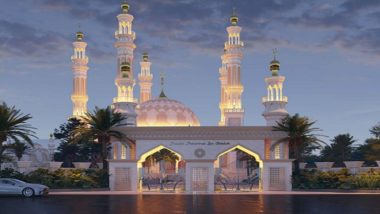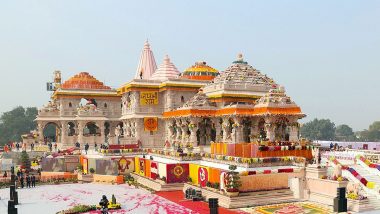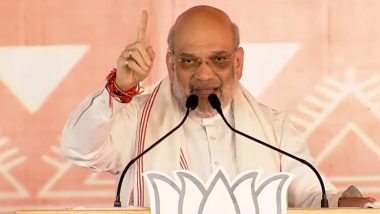Lucknow, September 20: The Indo-Islamic Cultural Foundation (IICF), set up by the Sunni Central Waqf Board to oversee the construction of the Dhannipur mosque in Ayodhya, has dissolved four committees, including one meant for the shrine's development, as it looks to speed up resource mobilisation for the project that has been hit by a severe fund crunch.
The decision was taken at a meeting of the IICF, its chief trustee and Sunni Central Waqf Board chairman Zufar Faruqi, who chaired the meet in Lucknow on Thursday, told PTI. The IICF is now focused on "better coordination" and speeding up the process of securing the mandatory clearances under the Foreign Contribution (Regulation) Act (FCRA), after which it would be able to seek donations from the community overseas, members of the trust said. Muhammad Bin Abdullah Masjid: First Brick for New Ayodhya Mosque With Gold Quran Inscriptions Reaches Mumbai From Mecca.
The IICF members admitted that it is "rather embarrassing" that only about "Rs 1 crore have been raised in the last four years", since a five-acre plot was allotted in Dhannipur village of Ayodhya district in Uttar Pradesh as the new site for a mosque that was pulled down by a mob on December 6, 1992. "The trust furnished all necessary details in this regard to the Centre in March and now, the entire focus is on speeding up the mosque-construction project by securing the necessary clearances," IICF secretary Athar Husain told PTI.
The committees that have been disbanded are the administrative committee, the finance committee, the development committee -- Masjid Muhammad Bin Abdullah -- and the media and publicity committee. No reason was assigned for the move but the IICF members said the decision is aimed at ensuring "better focus" on securing the clearances so that the mosque-construction project that has virtually been in limbo takes off. Uttar Pradesh: Ayodhya Mosque To Be Named After Prophet As ‘Muhammad Bin Abdullah Masjid’.
After a hotly-contested and prolonged legal battle, a five-judge Constitution Bench of the Supreme Court on November 9, 2019 handed over a 2.77-acre land, which was at the centre of a long legal scrutiny, to a trust for the construction of a Ram temple at the site and allotted five acres of land at a "prominent site" in Ayodhya for the mosque. Ever since, a grand Ram temple has come up at Ram Janmabhoomi and the deity has been consecrated at an impressive ceremony on January 22, 2024, whereas the mosque-construction project has been hit by a severe fund crunch.













 Quickly
Quickly




















